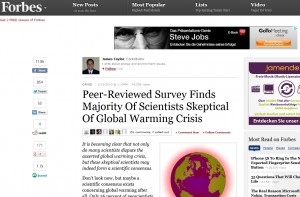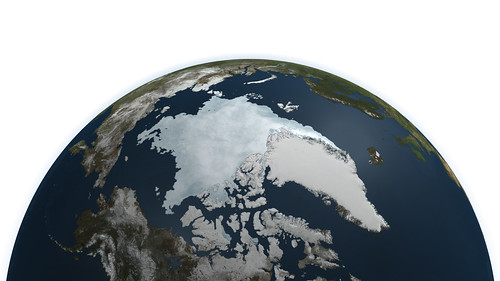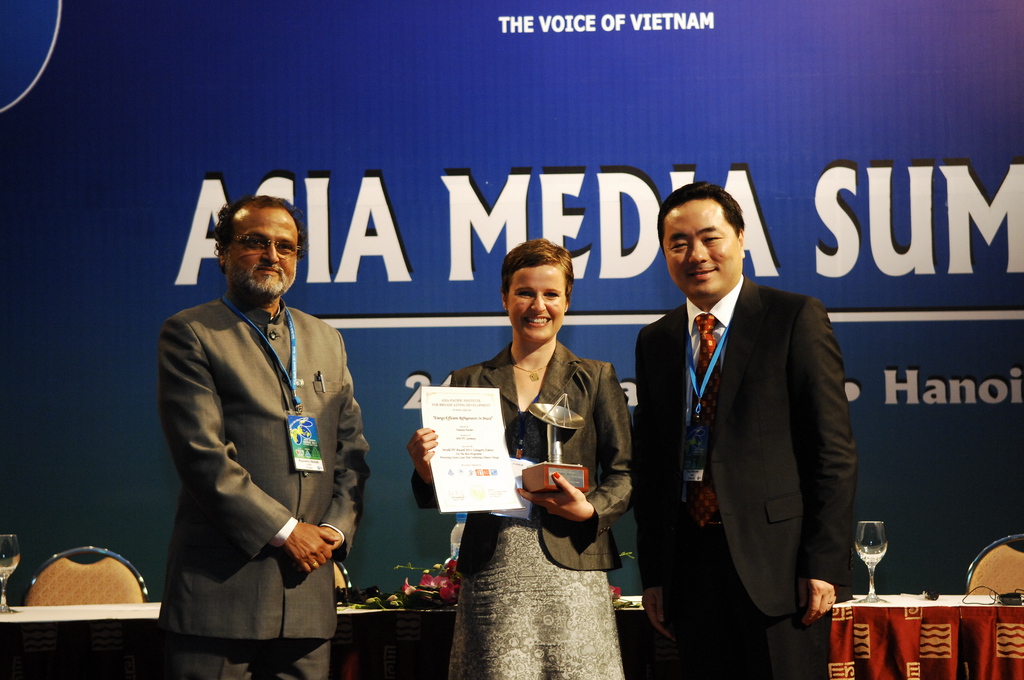Search Results for Tag: science
Climate Change Denial: Crudely does it
 What is so fascinating about climate change denial is not that it denies climate change, but that it does it so crudely. Last weekend we came across one very fine example that we thought is too good to keep from you, dear readers – even though it is not that recent: In February, the web edition of Forbes magazine ran a piece titled “Peer-Reviewed Survey Finds Majority Of Scientists Skeptical Of Global Warming Crisis”. Really? Finally, a sea change in scientific opinion?
What is so fascinating about climate change denial is not that it denies climate change, but that it does it so crudely. Last weekend we came across one very fine example that we thought is too good to keep from you, dear readers – even though it is not that recent: In February, the web edition of Forbes magazine ran a piece titled “Peer-Reviewed Survey Finds Majority Of Scientists Skeptical Of Global Warming Crisis”. Really? Finally, a sea change in scientific opinion?
Not quite. In fact, not at all. This lazy piece penned by James Taylor, a contributor to Forbes.com, deliberately leaves out the fact that the people surveyed were geoscientists and engineers. Plus, that they are all members of the Association of Professional Engineers and Geoscientists of Alberta, Canada and mostly in the pay of the petroleum industry – the largest employer in the region. It’s like polling the scientific advisers of the tobacco industry on the risks of smoking.
Of course, scientists will always differ on issues, especially important ones like Global Warming. But there is a scientific consensus that human-caused Climate Change is happening. And even if you hate this consensus, it does not go away. Not even if you misrepresent the facts. And to do so in such a crude fashion is just lame. But to insult your readers’ intelligence doesn’t go unpunished: Forbes readers duly tore the piece apart – and provided the details this simulation of “journalism” so conveniently left out. We assume James Taylor didn’t care and was too busy scribbling together his next climate sceptic hit jobs – a look at the Forbes archive of his articles suggests it was not his last one…
Scientists turn trash into crude energy

Remember Doc Brown? That crazy, white haired caricature of a scientist from the 1980s blockbuster scifi comedy Back to the Future? He’s the inventor of a spectacular (and – sadly – fictitious) device called the flux capacitor that is running first on plutonium, later on ordinary household garbage to power a time machine. Here’s what it looks like when Doc Brown is searching for fuel:
Scientists in Denmark have now hit upon a novel way to do just that: producing energy from household waste. While not quite matching Doc Browns achievement when it comes to the amount of energy harvested (let alone building a time machine) the scientists’ feat is impressive enough: Feeding biomass (comprising anything from sewage, compost, household garbage or waste from meat and dairy production) into what is essentially a 400 °C hot pressure cooker they managed to create something very close to fossil crude oil. What’s more, the production process used is more energy efficient than any other way of getting energy out of biomass.
We figure, if the Danish research team is still unhappy with the energy yield of their trash, they only have to wait another two years for expert help: In Back to the Future – Part II we learn that Doc Brown is going to visit us in 2015.
Landing on the moon was fake, so climate change is a lie

What do the moon landing and climate change have in common? They’re both fake. Well, at least if you belong to a certain small but very vocal group of people. As a part of this group, you might also be convinced that 9/11 was an inside job, that the CIA killed Martin Luther King and, yes, that radical free market policies will cure all the world’s ills.
Climate change deniers tend to be also conspiracy theorists and hard core free market ideologues, a new study finds. Apparently climate change denial very often goes together with the usual host of other fringe convictions and opinions. The reason for this, the climate science psychologist Adam Corner speculates in the Guardian could be
“…that it is the libertarian instinct to stick two fingers up at the mainstream – whatever the issue – that is important. Because a radical libertarian streak is the hallmark of free-market economics, and because free market views are popular on the political right, this is where climate change scepticism is most likely to be found.”
So what’s the solution? Corner suggests that
“the challenge of engaging with climate change sceptics is finding the lens that better fits their ideological views – not just shouting the science more loudly.”
Or maybe climate change has to be turned into a rogue topic – censored in the news, blasted by scientists, decried by the public – before it gains acceptance – among deniers. But then again, there is no such thing.
Arctic defrosting faster than ever
With the world expecting to celebrate world records at the London Olympics from today, the weather in recent weeks has delivered many high scores we should be less happy with: Record breaking high temperatures in the USA, droughts in Canada or deadly floods in Russia are just the most prominent examples.
Now there’s more. This summer, ice in arctic regions has been melting more extensively than ever seen before.
NASA scientists reported that in mid-July a whopping 97 percent of Greenland’s ice surface was melting. While the amount of surface melting can change extensively and in a matter of days (depending on the temperature of the air above), it’s never been observed to cover that large an area in more than 30 years of satellite observations.
Is this just a freak event or global warming in action? Scientists are careful not to draw a direct link between extreme weather events and climate change. For good reason: Some phenomena may not have been observed before, but scientists are not surprised to see them regardless of a global warming. Cores drilled out the Greenland ice sheets can help recover the temperature history for the place and indicate that extreme melting regularly occured every 150 years or so. This summer’s thawing episode is “right on time”, says one NASA glaciologist.
But the accumulation of extreme weather events is something you would plausibly expect under conditions of global warming, says Global Ideas climate expert Anders Levermann of the Potsdam Institute of Climate Impact Research. Even then, “we can’t say what the further impacts will be,” he cautions. In the case of Greenland “we don’t know what a period of extreme melting actually means except that in this moment more water is being lost and the water level is rising.”
Taking a long hard look at individual regions, however, can help establish more direct links between regional trends and global warming. At least 70 percent of the reduction of Arctic sea ice over the last 30 years may be man made suggests a study by a British-Japanese team of scientists. Here’s how the lead author puts it:
Award for GLOBAL IDEAS report on green fridges in Brazil
We have won! Again!
GLOBAL IDEAS reporter Vanessa Fischer, who you can see in the picture above, received the AIDB World Award today for “Science and Environment.” The trophy was awarded by the Asia-Pacific Europe Partnership Committee in Hanoi. Vanessas report “Energy-efficient refrigerators in Brazil” was called the “Best Programme Protecting Ozone Layer and Combating Climate Change.” As you can imagine, we all are over the moon about that award. 🙂










Feedback